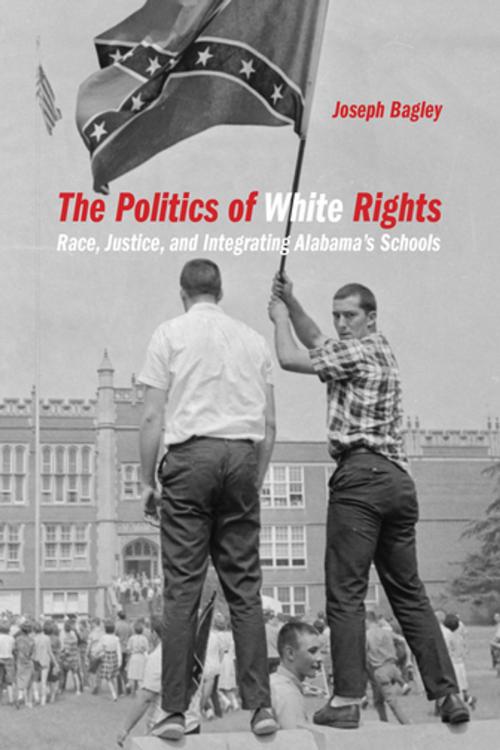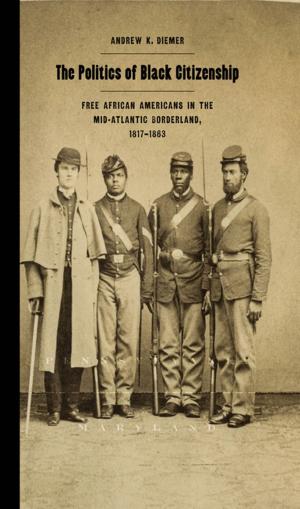The Politics of White Rights
Race, Justice, and Integrating Alabama's Schools
Nonfiction, Social & Cultural Studies, Political Science, Politics, Civil Rights, Social Science, Discrimination & Race Relations, History, Americas, United States, 20th Century| Author: | Joseph Bagley, Bryant Simon, Jane Dailey | ISBN: | 9780820354187 |
| Publisher: | University of Georgia Press | Publication: | December 15, 2018 |
| Imprint: | University of Georgia Press | Language: | English |
| Author: | Joseph Bagley, Bryant Simon, Jane Dailey |
| ISBN: | 9780820354187 |
| Publisher: | University of Georgia Press |
| Publication: | December 15, 2018 |
| Imprint: | University of Georgia Press |
| Language: | English |
In The Politics of White Rights, Joseph Bagley recounts the history of school desegregation litigation in Alabama, focusing on the malleability and durability of white resistance. He argues that the litigious battles of 1954–73 taught Alabama’s segregationists how to fashion a more subtle defense of white privilege, placing them in the vanguard of a new conservatism oriented toward the Sunbelt, not the South.
Scholars have recently begun uncovering the ways in which segregationists abandoned violent backlash and overt economic reprisal and learned how to rearticulate their resistance and blind others to their racial motivations. Bagley is most interested in a creedal commitment to maintaining “law and order,” which lay at the heart of this transition. Before it was a buzz phrase meant to conjure up fears of urban black violence, “law and order” represented a politics that allowed self-styled white moderates to begrudgingly accept token desegregation and to begin to stake their own claims to constitutional rights without forcing them to repudiate segregation or white supremacy.
Federal courts have, as recently as 2014, agreed that Alabama’s property tax system is crippling black education. Bagley argues that this is because, in the late 1960s, the politics of law and order became a politics of white rights, which supported not only white flight to suburbs and private schools but also nominally color-blind changes in the state’s tax code. These changes were designed to shield white money from the needs of increasingly black public education. Activists and courts have been powerless to do anything about them, because twenty years of desperate litigious combat finally taught Alabama lawmakers how to erect constitutional bulwarks that could withstand a legal assault.
In The Politics of White Rights, Joseph Bagley recounts the history of school desegregation litigation in Alabama, focusing on the malleability and durability of white resistance. He argues that the litigious battles of 1954–73 taught Alabama’s segregationists how to fashion a more subtle defense of white privilege, placing them in the vanguard of a new conservatism oriented toward the Sunbelt, not the South.
Scholars have recently begun uncovering the ways in which segregationists abandoned violent backlash and overt economic reprisal and learned how to rearticulate their resistance and blind others to their racial motivations. Bagley is most interested in a creedal commitment to maintaining “law and order,” which lay at the heart of this transition. Before it was a buzz phrase meant to conjure up fears of urban black violence, “law and order” represented a politics that allowed self-styled white moderates to begrudgingly accept token desegregation and to begin to stake their own claims to constitutional rights without forcing them to repudiate segregation or white supremacy.
Federal courts have, as recently as 2014, agreed that Alabama’s property tax system is crippling black education. Bagley argues that this is because, in the late 1960s, the politics of law and order became a politics of white rights, which supported not only white flight to suburbs and private schools but also nominally color-blind changes in the state’s tax code. These changes were designed to shield white money from the needs of increasingly black public education. Activists and courts have been powerless to do anything about them, because twenty years of desperate litigious combat finally taught Alabama lawmakers how to erect constitutional bulwarks that could withstand a legal assault.















